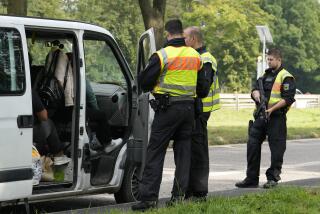2 Germanys OK Lifting of Their Border Controls
- Share via
BONN — In their first-ever meeting, the interior ministers from the two democratic Germanys agreed Wednesday to lift all controls on personal movements across the inner-German frontier before the summer holiday period.
The decision, announced at a joint news conference held by West German Interior Minister Wolfgang Schaeuble and his newly installed East German counterpart, Peter-Michael Diestel, will effectively erase a frontier that has divided the heart of Europe and separated the two German states since the end of World War II.
Until late last year, it was acknowledged as one of the most dangerous, heavily fortified stretches of the Iron Curtain.
On Wednesday, the announcement of its demise became one of the initial concrete steps in the process of German unity, a process that will change the political shape of Europe.
“We’re agreed on the goal that personnel controls on the inner-German border should disappear completely as soon as possible,” Schaeuble told reporters.
The decision could also signal an eventual end to border controls between East and West Berlin and between West Berlin and East Germany, but a West German government spokesman said the two ministers did not address the question directly during their talks.
The four major victorious World War II powers--the United States, Britain, France and the Soviet Union--remain legally sovereign in the former German capital, and the West German official said that any changes in the frontier controls would have to be agreed upon with them.
However, a spokesman at the U.S. mission in West Berlin noted that the three Western allies have always favored free movement in the city and that the East Germans, not the Soviets, erected the Berlin Wall and pressed for the stringent controls in the city.
Foreigners crossing between East and West Berlin at the famous Checkpoint Charlie are not checked at all on the western side. East Germans control the eastern side of the checkpoint.
Diestel said the two men have not settled on a specific date for lifting the controls but said the action will take place before the traditional summer vacation period begins in early July.
The interior ministers’ meeting was one of a series of initial contacts between opposite numbers in the two German cabinets scheduled for this week.
These contacts begin the substantive phase of unification.
The two labor ministers were meeting Wednesday evening to discuss employment, while Cabinet members in charge of foreign affairs, economic affairs, research and cooperation and development are all scheduled to take place in the next week.
West German Chancellor Helmut Kohl is also expected to meet East German Prime Minister Lothar de Maiziere shortly, although chancellery officials said they expect no date to be set until Kohl returns from a post-Easter vacation later this week.
De Maiziere is scheduled to announce details of his government’s proposals for reunification in a statement to the East Berlin Parliament today.
The flurry of activity is linked to the hope on the part of both Germanys to complete a state treaty by July, setting the conditions for the economic, social and currency union. Such a treaty would form the basis of reunification.
The speed of this process has been dictated largely by the collapse of public morale in East Germany in the months after a street revolution toppled the neo-Stalinist regime from power last fall.
The need to complete essential steps, including the currency union, before the summer vacation period is considered vital by both German governments to stabilize East Germany and prevent resumption of the flow of East German refugees to the West.
Before last month’s election, East Germans, unsure of their future, were fleeing their country for the West at a rate of about 2,000 a week.
Aside from their commitment to lift border controls, the two interior ministers agreed on an exchange of several hundred civil servants as an initial step to smoothing an integration of the two bureaucracies, on establishment of a joint working group to fight terrorism and drugs and also on the exchange of senior police officials.
Schaeuble said West Germany’s recently retired senior law enforcement officer and former head of the West German Federal Criminal Agency, Heinrich Boge, will work as an adviser in Diestel’s ministry.
The decision to open the inner-German border is expected to mean that East Germany will adjust visa and entry requirements to fit European Community norms, since the move will effectively extend the EC’s eastern frontiers to the East German-Czechoslovak and East German-Polish borders.
West Germany is one of five European Community nations planning to end all border controls with each other later this year as part of the creation of an internal EC market by the end of 1992.
In announcing plans to lift the inner-German border controls, Schaeuble noted, “It is also clear to us that this means we must transfer these controls to the outer borders, including air and sea ports.”
More to Read
Sign up for Essential California
The most important California stories and recommendations in your inbox every morning.
You may occasionally receive promotional content from the Los Angeles Times.












